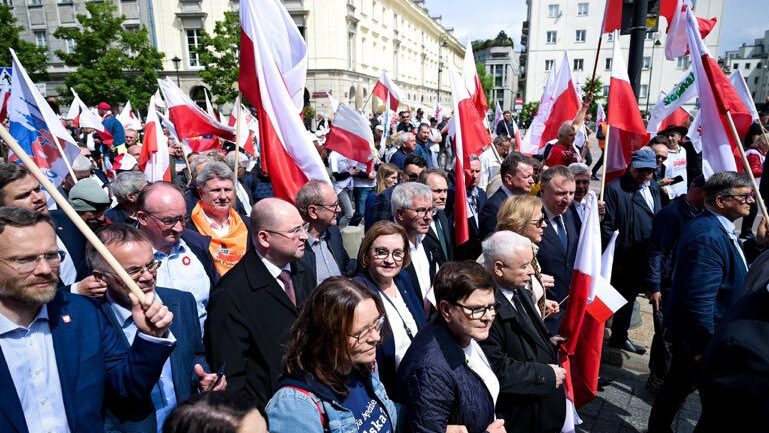
Demonstration against the Green Deal in Warsaw, Friday, May 10th.
Photo: @mblaszczak on X, 10 May 2024
Approximately a dozen Polish farmers initiated a sit-down protest in the halls of the Polish Parliament (Sejm) on Thursday against what they view as existential threats to their way of life, citing lax tariffs on Ukrainian agricultural imports and Brussels’ environmental regulations.
#StrajkRolników #StrajkOkupacyjny rolników w #Sejm
— Bogdan Kowalski (@BogdanKowalski_) May 9, 2024
Jestem z Wami. 💪🇵🇱🇵🇱🇵🇱 pic.twitter.com/aMGeIkTVVh
In dramatic scenes, members of the Orka farmers’ union commenced their protest, saying that they would stay until they obtained a one-on-one audience with Prime Minister Donald Tusk.
“We are not bandits,” declared farmer representative Mariusz Borowiak at an impromptu press conference. The Polish agricultural industry has been rocked by an EU decision to suspend tariffs with neighbouring Ukraine, in a dispute that has resulted in ongoing blockades of the Polish border with Ukraine.
The farmers originally entered the Sejm using passes obtained from the Law and Justice (PiS) and Confederation parties. They were invited to talks with Agriculture Minister Czesław Siekierski, rather than Tusk personally, after they began their sit-down protest.
This direct action came before a day of protest by Polish farmers on Friday, May 10th, as those involved in the sit-down protest complained both of ineffective checks at the Polish border with Ukraine and impending regulations from the European Union’s Green New Deal.
Polish MEP Beata Szydło (PiS) said in a comment to The European Conservative,
As an MEP, for years I have been warning about the consequences of the Green Deal, not only for agriculture but for the entire economy of the European Union. European industry is ceasing to be competitive, as can be seen in Poland, which has developed extremely dynamically for many years and is now threatened by a crisis brought about directly by the Green Deal.
Szydło said the Friday demonstration was “not a one-off event but the beginning of the fight against the Green Deal,” adding that 150,000 signatures have already been collected for a Polish referendum on rejection of the Green Deal.
Russia’s invasion of Ukraine has caused a scramble to reroute the grain trade from the Black Sea through Eastern Europe, including Poland, over the past year. Only last week, Polish farmers ended a blockade of the frontier with Ukraine, having secured the promise of a temporary embargo.
Warsaw has been dealing with a glut of cheap Ukrainian agricultural products since 2022, when Eurocrats decided to lift tariffs against Ukraine to provide emergency relief to the war-torn nation.
Donald Tusk has been in talks with farming groups since February. Europe has seen a rising wave of agrarian unease over the past year due to a combination of green overregulation, the impact of the Ukrainian war, and the risk posed by free trade agreements.
